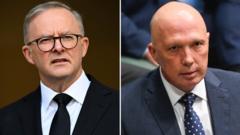Prime Minister Anthony Albanese's Labor Party faces a challenging race against Peter Dutton of the Liberal Party, with opinion polls indicating a closely contested battle for power.
Australia's Federal Election Set for May 3 Amid Tight Competition

Australia's Federal Election Set for May 3 Amid Tight Competition
Australia gears up for a crucial federal election on May 3, with key issues like cost of living and healthcare at the forefront.
Australia is preparing for its federal election scheduled for May 3, with the political landscape indicating a tightly contested race between the incumbent Labor Party, led by Prime Minister Anthony Albanese, and the Liberal Party's Peter Dutton. Albanese announced the election date during a press conference at Parliament House, emphasizing the significance of the upcoming vote as a turning point for the nation.
As both major parties vie for support, opinion polls suggest a narrow margin that may require collaboration with independent MPs or minor parties. This scenario follows record shares of votes for such parties in the last election. The key focus of the campaign is expected to revolve around pressing issues like the cost of living, healthcare access, and housing affordability.
During his address, Albanese reaffirmed his commitment to improving living conditions by proposing various measures, including enhancements to free healthcare services, reductions in student debt, and modest tax cuts. He positioned the upcoming election as a choice between his administration's constructive plans versus Dutton’s purported approach of regression. "It takes more than three years to rectify a decade of issues," Albanese remarked, directly referencing the challenges inherited from the previous coalition government's policies.
Dutton, on the other hand, criticized the current government's handling of economic conditions, suggesting that Australians are suffering due to what he termed "Labor's bad decisions." His campaign promises to focus on regaining financial stability by reducing unnecessary government expenditures and managing immigration more stringently, as well as lowering energy and fuel costs.
The environment and housing have risen to the forefront of voter concerns, alongside ongoing issues like crime and immigration. While Labor has historically dominated Australian politics, recent shifts indicate rising sentiment towards minor parties, such as the Greens, which stress the importance of holding Labor accountable on key issues.
Albanese, a seasoned politician who ascended to the prime ministership after a turbulent era marked by leadership changes, has maintained promises of integrity and unity. However, he also encountered setbacks, including a failed referendum to recognize Indigenous rights in the constitution and criticism concerning his personal investment in real estate amid a housing crisis.
Dutton's reputation as a hard-right politician with a history of controversial stances on social issues continues to shape his image as he attempts to broaden his appeal beyond conservative bases. As both parties gear up for an intense campaign period, Australians prepare to weigh their options in a significant electoral moment poised to impact the country's future trajectory.





















